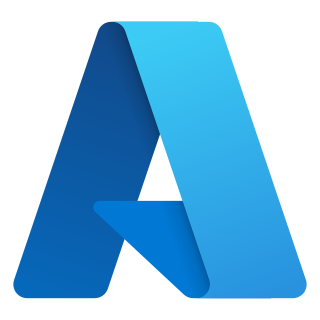Related Research Articles
RightScale was a company that sold software as a service for cloud computing management for multiple providers. The company was based in Santa Barbara, California. It was acquired by Flexera Software in 2018.

Microsoft Azure, often referred to as Azure, is a cloud computing platform run by Microsoft. It offers access, management, and the development of applications and services through global data centers. It also provides a range of capabilities, including software as a service (SaaS), platform as a service (PaaS), and infrastructure as a service (IaaS). Microsoft Azure supports many programming languages, tools, and frameworks, including Microsoft-specific and third-party software and systems.

Cloud Foundry is an open source, multi-cloud application platform as a service (PaaS) governed by the Cloud Foundry Foundation, a 501(c)(6) organization.
A cloud database is a database that typically runs on a cloud computing platform and access to the database is provided as-a-service. There are two common deployment models: users can run databases on the cloud independently, using a virtual machine image, or they can purchase access to a database service, maintained by a cloud database provider. Of the databases available on the cloud, some are SQL-based and some use a NoSQL data model.

OpenShift is a family of containerization software products developed by Red Hat. Its flagship product is the OpenShift Container Platform — a hybrid cloud platform as a service built around Linux containers orchestrated and managed by Kubernetes on a foundation of Red Hat Enterprise Linux. The family's other products provide this platform through different environments: OKD serves as the community-driven upstream, Several deployment methods are available including self-managed, cloud native under ROSA, ARO and RHOIC on AWS, Azure, and IBM Cloud respectively, OpenShift Online as software as a service, and OpenShift Dedicated as a managed service.

Plotly is a technical computing company headquartered in Montreal, Quebec, that develops online data analytics and visualization tools. Plotly provides online graphing, analytics, and statistics tools for individuals and collaboration, as well as scientific graphing libraries for Python, R, MATLAB, Perl, Julia, Arduino, JavaScript and REST.
Google Cloud Platform (GCP), offered by Google, is a suite of cloud computing services that provides a series of modular cloud services including computing, data storage, data analytics and machine learning, alongside a set of management tools. It runs on the same infrastructure that Google uses internally for its end-user products, such as Google Search, Gmail, and Google Docs, according to Verma, et.al. Registration requires a credit card or bank account details.
ZeroVM is an open source light-weight virtualization and sandboxing technology. It virtualizes a single process using the Google Native Client platform. Since only a single process is virtualized, the startup overhead is in the order of 5 ms.

DigitalOcean Holdings, Inc. is an American multinational technology company and cloud service provider. The company is headquartered in New York City, New York, US, with 15 globally distributed data centers. DigitalOcean provides developers, startups, and SMBs with cloud infrastructure-as-a-service platforms.
Kubernetes is an open-source container orchestration system for automating software deployment, scaling, and management. Originally designed by Google, the project is now maintained by the Cloud Native Computing Foundation.

Mirantis Inc. is a Campbell, California, based B2B open source cloud computing software and services company. Its primary container and cloud management products, part of the Mirantis Cloud Native Platform suite of products, are Mirantis Container Cloud and Mirantis Kubernetes Engine. The company focuses on the development and support of container and cloud infrastructure management platforms based on Kubernetes and OpenStack. The company was founded in 1999 by Alex Freedland and Boris Renski. It was one of the founding members of the OpenStack Foundation, a non-profit corporate entity established in September, 2012 to promote OpenStack software and its community. Mirantis has been an active member of the Cloud Native Computing Foundation since 2016.
The Serverless Framework is a free and open-source web framework written using Node.js. Serverless is the first framework developed for building applications on AWS Lambda, a serverless computing platform provided by Amazon as a part of Amazon Web Services. Currently, applications developed with Serverless can be deployed to other function as a service providers, including Microsoft Azure with Azure Functions, IBM Bluemix with IBM Cloud Functions based on Apache OpenWhisk, Google Cloud using Google Cloud Functions, Oracle Cloud using Oracle Fn, Kubeless based on Kubernetes, Spotinst and Webtask by Auth0.

The OpenBMC project is a Linux Foundation collaborative open-source project that produces an open source implementation of the baseboard management controllers (BMC) firmware stack. OpenBMC is a Linux distribution for BMCs meant to work across heterogeneous systems that include enterprise, high-performance computing (HPC), telecommunications, and cloud-scale data centers.

Netlify is a remote-first cloud computing company that offers a development platform that includes build, deploy, and serverless backend services for web applications and dynamic websites. The platform is built on open web standards, making it possible to integrate build tools, web frameworks, APIs, and various web technologies into a unified developer workflow.

CloudBolt is a hybrid cloud management platform developed by CloudBolt Software for deploying and managing virtual machines (VMs), applications, and other IT resources, both in public clouds and in private data centers.
Kubeflow is an open-source platform for machine learning and MLOps on Kubernetes introduced by Google. The different stages in a typical machine learning lifecycle are represented with different software components in Kubeflow, including model development (Kubeflow Notebooks), model training (Kubeflow Pipelines, Kubeflow Training Operator), model serving (KServe), and automated machine learning (Katib).

IBM Cloud is a set of cloud computing services for business offered by the information technology company IBM.
Teleport is an open-source tool for providing zero trust access to servers and cloud applications using SSH, Kubernetes and HTTPS. It can eliminate the need for VPNs by providing a single gateway to access computing infrastructure via SSH, Kubernetes clusters, and cloud applications via a built-in proxy.

The Software for Open Networking in the Cloud or alternatively abbreviated and stylized as SONiC, is a free and open source network operating system based on Linux. It was originally developed by Microsoft and the Open Compute Project. In 2022, Microsoft ceded oversight of the project to the Linux Foundation, who will continue to work with the Open Compute Project for continued ecosystem and developer growth. SONiC includes the networking software components necessary for a fully functional L3 device and was designed to meet the requirements of a cloud data center. It allows cloud operators to share the same software stack across hardware from different switch vendors and works on over 100 different platforms. There are multiple companies offering enterprise service and support for SONiC,.

CBL-Mariner is a free and open-source Linux distribution that Microsoft has developed. It is the base container OS for Microsoft Azure services and the graphical component of WSL 2.